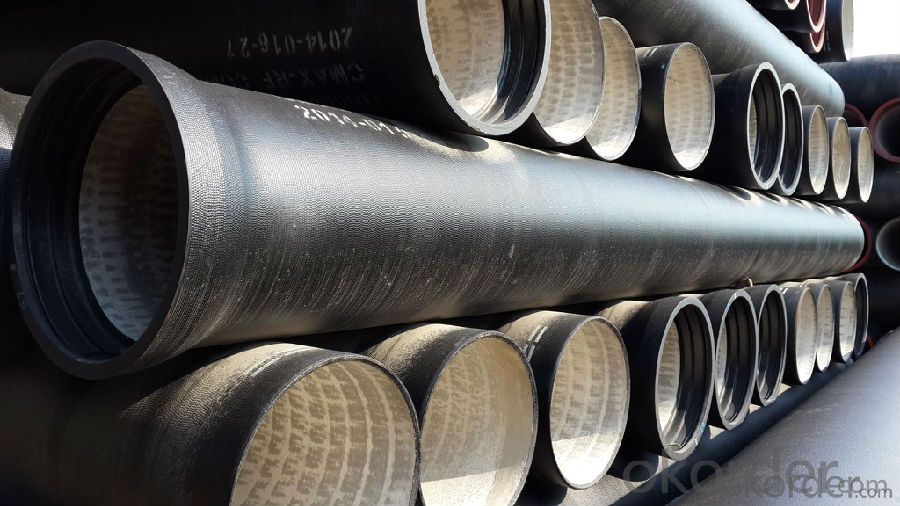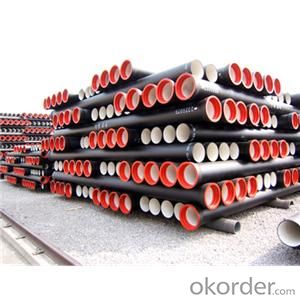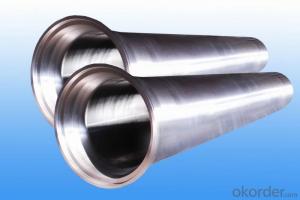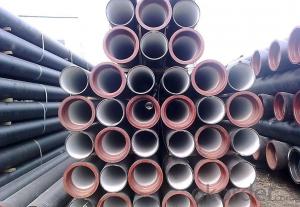Ductile Iron Pipe of China DN100 EN545 C25 Sanitary
- Loading Port:
- China main port
- Payment Terms:
- TT or LC
- Min Order Qty:
- 20 m.t.
- Supply Capability:
- 200000 m.t./month
OKorder Service Pledge
OKorder Financial Service
You Might Also Like
1,Ductile Iron Pipe Description :
1) Pipes confirm to ISO2531,K9 class,T type joint,6m long,with inside cements lining conform to ISO4179, outside Zinc spraying(130g/m2) and bitumen coating(70μm) conform to ISO8179.
2) Pipe ends: Spigot and socket ends, with 100% SBR rubber gaskets accoding to ISO4633
3) we can do third party inspection according to customer's request.
4) Our products have been sold to many international market,such as Middle East and South East Asia and Africa.
2,Main Features of the Ductile Iron Pipe:
·High yield strength
·High tensile Strength
·High corrosion resistance
·Pressure Resistence
·Anti-corrosion
·Installation is convenient
·Satisfy the highest hygienic standards
3,Ductile Iron Pipe Images:


4. Ductile Iron Pipe Specification
Standard: API SPEC 5L 44th eidtion,ASTM A252-98(2007)
Grade: A53 Grades A/B, ASTM A106 Grades B/C,ASTM A179
AWWA, C200, ASTM A139, ASTM A120, API 5L Grade B
X42, X52, X56, X60, X65, X70, X80, X100
Weld Alternatives: LSAW
OD size range: 6.4~44.5mm
Wall thickness: 406.4~1422mm
Length: 3 - 12 m according to requirment
Note: Other grade can also be provided after consulting. Special design are available
for coal slurry conveyance LSAW line tube -- Service.
Internal lining: ductile iron pipes shall have an internal cement mortar lining in acc with ISO4179.
External coating: ductile iron pipes shall be externally coated with metallic zinc spray plus a further layer of resin painting to ISO8179.
Gasket: 100% SBR/NBR/EPDM rubber gasket in accordance with ISO4633.
Packing: ductile iron pipes from DN100 to DN300 be bundled with steel belts, others are in bulk.
Payment term: L/C, T/T.
Packing: In bulk vessel or in container
5.FAQ:
We have organized several common questions for our clients,may help you sincerely:
1.Q: Why would you choose ductile iron pipe rather than other pipe materials?
A:The reasons are obvious for that not only ductile iron pipe possesses the inherent strength and flexibility of ductile iron, combined with proven corrosion protection systems, but also the cost savings can be achieved from design to installation and commissioning.
2.Q:Why can you guarantee the inner of pipes can’t be corroded?
A: High alumina cement mortar lining and sulphate-resistant cement mortar lining. These two special linings are applicable to inner anti-corrosion for sewage pipes, improving resistance to erosion of the sewage components.
- Q:How can 4 inch ductile iron pipe be connected with 2 inch galvanized pipe?
- Ductile cast iron used for more than 18 by adding nodulizer, after centrifugal ductile cast iron machine high speed centrifugal cast pipe, called "ductile" (Ductile Cast Iron Pipes), referred to as ball pipe, ductile iron pipe and ductile iron pipe etc.. The utility model is mainly used for conveying water, and is an ideal choice for tap water pipes.
- Q:What is the expected hydraulic performance of ductile iron pipes?
- Ductile iron pipes are known for their exceptional hydraulic performance, boasting a remarkably smooth inner surface that facilitates fluid flow, resulting in reduced friction losses and increased flow rates. With excellent resistance to corrosion and abrasion, these pipes demonstrate long-lasting efficacy in diverse water and wastewater applications. In addition, the high tensile strength of ductile iron pipes enables them to withstand substantial internal and external loads without any deformation or failure. Their versatility allows for usage in both above-ground and below-ground scenarios, encompassing water distribution systems, sewage and wastewater transport, industrial piping, and irrigation systems. Moreover, the flexibility and resilience of ductile iron pipes enable them to adapt to ground movement and settle without any risk of breakage. This attribute proves invaluable in areas with unstable soil conditions or seismic activity, making these pipes a dependable choice. Overall, the hydraulic performance of ductile iron pipes is characterized by efficient flow, minimal pressure losses, durability, and the capacity to withstand various external forces. These exceptional qualities establish them as a favored option for water infrastructure projects, ensuring reliable and efficient fluid transportation over a prolonged service life.
- Q:What are the different types of thrust restraints for ductile iron pipe?
- There are several types of thrust restraints used for ductile iron pipe, including thrust blocks, tie rods, and anchor blocks. Thust blocks are concrete structures placed on either side of a bend or fitting to counteract the forces created by water pressure. Tie rods are steel rods that are anchored to the pipe and secured to an external structure, providing additional support against thrust. Anchor blocks are also made of concrete and are installed at regular intervals along the pipeline to prevent movement and absorb thrust forces.
- Q:Can ductile iron pipe be used for water treatment plant sludge handling?
- Yes, ductile iron pipe can be used for water treatment plant sludge handling. Ductile iron pipes are known for their durability, strength, and resistance to corrosion, making them suitable for handling various types of wastewater and sludge. They can efficiently transport sludge from different stages of the water treatment process within the plant without any adverse effects.
- Q:How are ductile iron pipes inspected for quality control?
- Ductile iron pipes are inspected for quality control through various methods such as visual inspection, hydrostatic pressure testing, dimensional checks, and non-destructive testing techniques like ultrasonic testing. These inspections ensure that the pipes meet the required specifications and standards, and any defects or abnormalities can be detected before installation or use.
- Q:How are ductile iron pipes protected against stray current corrosion?
- Ductile iron pipes are protected against stray current corrosion through the implementation of various preventive measures and protective coatings. Stray current corrosion occurs when an electric current passes through the pipe, leading to accelerated corrosion and potential damage. To prevent this, the following measures are typically adopted: 1. Electrical isolation: Ductile iron pipes are electrically isolated from other metallic structures using insulating materials, such as rubber gaskets or non-conductive coatings. This isolation prevents the flow of stray current through the pipe, minimizing the risk of corrosion. 2. Cathodic protection: Cathodic protection is a widely used technique to protect ductile iron pipes from stray current corrosion. It involves the installation of sacrificial anodes or impressed current systems near the pipe. These anodes or systems release a controlled electric current, which counteracts the stray current and ensures that the iron pipe remains cathodically protected. 3. Coatings: Ductile iron pipes are typically coated with protective layers to enhance their resistance against corrosion. One common coating is a fusion-bonded epoxy (FBE) coating, which provides a high level of protection against stray current corrosion. FBE coatings act as a barrier, preventing the electrical contact between the pipe and the surrounding environment. 4. Monitoring and maintenance: Regular monitoring and maintenance are essential to ensure the ongoing protection of ductile iron pipes against stray current corrosion. This involves inspecting the protective coatings for any damage or degradation and promptly repairing or replacing them as needed. Additionally, monitoring systems can be installed to detect and measure stray currents, allowing for timely intervention if necessary. By implementing these protection measures, ductile iron pipes can effectively guard against stray current corrosion, prolonging their lifespan and ensuring the integrity of the pipeline infrastructure.
- Q:What are the typical joint sealing requirements for ductile iron pipes under pressure?
- To ensure a secure connection without any leakage, ductile iron pipes under pressure typically require the use of gaskets and mechanical joints. Gaskets, commonly made of rubber or synthetic materials, are positioned between the pipe ends to establish a tight seal. These gaskets are designed to withstand the pressure of the fluid flow and prevent any leaks. They also provide flexibility to accommodate slight misalignment or pipe movement. Another commonly employed method for sealing ductile iron pipes is through mechanical joints, such as push-on joints or restrained joints. These joints securely hold the pipe ends together, eliminating the need for additional gaskets while providing a dependable seal. To guarantee effective joint sealing, proper installation techniques are crucial. This involves correctly aligning the pipes, appropriately tightening bolts or screws, and utilizing suitable lubricants or sealants. It's important to acknowledge that the specific joint sealing requirements for ductile iron pipes under pressure may differ based on the application, the type of fluid being transported, and the relevant industry standards or regulations. Therefore, consulting the manufacturer's guidelines and applicable codes is vital to determine the appropriate joint sealing requirements for a specific project.
- Q:What is the typical lifespan of ductile iron pipe?
- The typical lifespan of ductile iron pipe can vary depending on various factors such as the quality of the pipe, the conditions it is exposed to, and the maintenance practices employed. However, on average, ductile iron pipe has a lifespan of around 100 years. This is due to its inherent strength and durability, which allows it to withstand high pressure and various environmental conditions. Additionally, ductile iron pipe is often coated with protective materials such as cement mortar lining or polyethylene encasement, further enhancing its longevity. Regular inspections and maintenance can also help extend the lifespan of ductile iron pipe, ensuring that any issues or potential damages are identified and addressed promptly.
- Q:Can ductile iron pipe be used for horizontal directional drilling?
- HDD, a trenchless method for installing underground utilities like pipelines, can indeed utilize ductile iron pipe. The choice of ductile iron pipe in HDD projects stems from its remarkable strength, durability, and ability to withstand the strains and stresses associated with directional drilling. It exhibits exceptional resistance to external loads and can endure the bending and pulling forces involved in HDD installations. Nevertheless, it is crucial to consider variables like pipe diameter, wall thickness, and soil conditions when selecting the appropriate pipe for HDD projects. Furthermore, it is imperative to adhere to proper installation techniques and take precautionary measures to ensure the long-term performance and integrity of ductile iron pipe in HDD applications.
- Q:Can ductile iron pipes be used in agricultural applications?
- Yes, ductile iron pipes can be used in agricultural applications. Ductile iron pipes have excellent strength and durability, making them suitable for various agricultural purposes. They can be used for irrigation systems, water supply pipelines, and drainage systems in farms and agricultural fields. Ductile iron pipes are resistant to corrosion and have a long lifespan, which is crucial for agricultural applications where the pipes are exposed to various environmental factors and chemicals. Additionally, ductile iron pipes have the ability to withstand high-pressure water flow, making them ideal for transporting water for irrigation purposes. Overall, ductile iron pipes are a reliable and efficient choice for agricultural applications due to their strength, durability, corrosion resistance, and ability to handle high-pressure water flow.
1. Manufacturer Overview |
|
|---|---|
| Location | |
| Year Established | |
| Annual Output Value | |
| Main Markets | |
| Company Certifications | |
2. Manufacturer Certificates |
|
|---|---|
| a) Certification Name | |
| Range | |
| Reference | |
| Validity Period | |
3. Manufacturer Capability |
|
|---|---|
| a)Trade Capacity | |
| Nearest Port | |
| Export Percentage | |
| No.of Employees in Trade Department | |
| Language Spoken: | |
| b)Factory Information | |
| Factory Size: | |
| No. of Production Lines | |
| Contract Manufacturing | |
| Product Price Range | |
Send your message to us
Ductile Iron Pipe of China DN100 EN545 C25 Sanitary
- Loading Port:
- China main port
- Payment Terms:
- TT or LC
- Min Order Qty:
- 20 m.t.
- Supply Capability:
- 200000 m.t./month
OKorder Service Pledge
OKorder Financial Service
Similar products
New products
Hot products
Related keywords



























